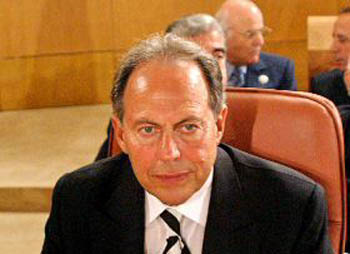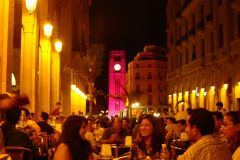The Ottoman central government did not concern itself with the internal social structure and local customs of Mount Lebanon. It regarded Mount Lebanon as state-administered land and the local notables as tax farmers. The northern part of the mountain was subject to the pasha of Tripoli; the southern part to the pasha of Sidon (whose actual seat was Acre after 1750). Christian historians have usually argued that Mount Lebanon was a single unit with a self-conscious identity and an autonomous and locally legitimized political regime and that the land was private property (Holt & Lewis 1962; Salibi 1988: 108
 AP, Romania's decision to invite Lebanon's prime minister to the Francophone Summit but exclude its president has sparked a diplomatic flap with France, which has supported the snub. It is the third time in 10 months that Lebanon has found its prime minister to be more acceptable at international meetings than its president, who is seen as having been imposed on Lebanon by Syrian influence.
AP, Romania's decision to invite Lebanon's prime minister to the Francophone Summit but exclude its president has sparked a diplomatic flap with France, which has supported the snub. It is the third time in 10 months that Lebanon has found its prime minister to be more acceptable at international meetings than its president, who is seen as having been imposed on Lebanon by Syrian influence.
Lebanon will boycott the Francophone Summit, scheduled to be held in Bucharest in September, if its president is not invited, the office of President Emile Lahoud said Wednesday.
"It is really astonishing for the French state to adopt this position," the president's office said in a statement late Tuesday. "It regrettably confirms the information about direct interference by French President Jacques Chirac." Chirac is known to be at odds with Lahoud and was close to the Lebanese leader's political rival, former Prime Minister Rafik Hariri, who was assassinated in February last year.
Please click View Video to view the video of Karen El Khazen, during a prime on LBC. The video is 20 MB (4 min) You can view the video by using Windows media player. With a High speed internet connection the video should not take more then 3 min to completely open, with a dial up it will connect but will take a little more time (8 -12 min)
I am introduced to highway code, Lebanon-style, while squeezed in the back of a taxi with two large women. From the chic designer-boutique area of Verdun, we weave a few kilometers northeast along the Corniche, the Mediterranean promenade, to the central district known as downtown. The ride is a medley of contrasting sights: half-destroyed buildings, their walls peppered with huge bullet holes struggle to stay up; adjacent are their pristine neighbors, the sheen of newly built high-rise towers. Scattered around the area are numerous cranes and building sites. Palm trees fringe the roads in between. Beirut as a holiday resort might not sound so appealing but this once- popular destination is desperately trying to shake off its war-battered image. A huge rebuilding project, one of the world's largest, has been transforming the city center, but officials and locals don't want tourists to have to wait the 20 years it's likely to complete. The mood is buoyant, hefty investment by wealthy Lebanese expatriates indicates optimism for the future and the number of new hotels, shopping and dining areas is increasing. Beirut is definitely making a welcome return to the tourist map. Beirut is shaking off its war- torn past to recreate itself, writes Emma Levine. Beirut drivers have a dreadful reputation, even in the context of the Middle East. For every screech of wheels taking a corner too fast, there are a dozen cases of reckless lane swapping. Crossing the road is a visitor's main challenge.
Beirut is shaking off its war- torn past to recreate itself, writes Emma Levine. Beirut drivers have a dreadful reputation, even in the context of the Middle East. For every screech of wheels taking a corner too fast, there are a dozen cases of reckless lane swapping. Crossing the road is a visitor's main challenge.
Khazen History


Historical Feature:
Churches and Monasteries of the Khazen family

St. Anthony of Padua Church in Ballouneh
Mar Abda Church in Bakaatit Kanaan
Saint Michael Church in Bkaatouta
Saint Therese Church in Qolayaat
Saint Simeon Stylites (مار سمعان العامودي) Church In Ajaltoun
Virgin Mary Church (سيدة المعونات) in Sheilé
Assumption of Mary Church in Ballouneh
1 - The sword of the Maronite Prince
2 - LES KHAZEN CONSULS DE FRANCE
3 - LES MARONITES & LES KHAZEN
4 - LES MAAN & LES KHAZEN
5 - ORIGINE DE LA FAMILLE
Population Movements to Keserwan - The Khazens and The Maans
ما جاء عن الثورة في المقاطعة الكسروانية
ثورة أهالي كسروان على المشايخ الخوازنة وأسبابها
Origins of the "Prince of Maronite" Title
Growing diversity: the Khazin sheiks and the clergy in the first decades of the 18th century
Historical Members:
Barbar Beik El Khazen [English]
Patriach Toubia Kaiss El Khazen(Biography & Life Part1 Part2) (Arabic)
Patriach Youssef Dargham El Khazen (Cont'd)
Cheikh Bishara Jafal El Khazen
Patriarch Youssef Raji El Khazen
The Martyrs Cheikh Philippe & Cheikh Farid El Khazen
Cheikh Nawfal El Khazen (Consul De France)
Cheikh Hossun El Khazen (Consul De France)
Cheikh Abou-Nawfal El Khazen (Consul De France)
Cheikh Francis Abee Nader & his son Yousef
Cheikh Abou-Kanso El Khazen (Consul De France)
Cheikh Abou Nader El Khazen
Cheikh Chafic El Khazen
Cheikh Keserwan El Khazen
Cheikh Serhal El Khazen [English]
Cheikh Rafiq El Khazen [English]
Cheikh Hanna El Khazen
Cheikha Arzi El Khazen
Marie El Khazen